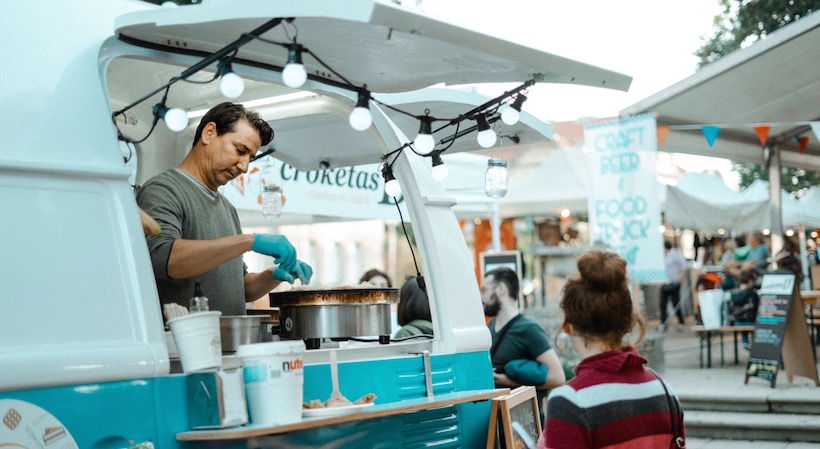With careful planning and business acumen, epicurean entrepreneurs can make their dream of owning and operating a food truck a reality. The mobile food truck business is a more than $1 billion industry in America, with plenty of competition. Still, if you’re determined to take your culinary smarts to the street, it’s best to come up with a comprehensive plan before hitting the road.
StartupNation exclusive discounts and savings on Dell products and accessories: Learn more here
Gearing up for success
Whether you have a passion for whipping up tacos or deli sandwiches, you can build a cult following behind your brand. Whatever menu you choose, you must find your niche. In other words, you need to come up with a menu that makes you stand out from the competition. Once you’ve got your standout menu items, it’s time to develop your business plan.
Cook up a business plan
Try to estimate the startup costs for every aspect of your business.
For example, include cleaning equipment, ingredients and other initial expenses in your estimate. You’ll also need to account for ongoing costs, like a point-of-sale system and fuel for your truck. This information will help you figure out how much you need to sell to recoup your initial investment and turn a profit every month.
If you’ve never written a business plan, check out this handy guide for tips.
Your most significant expense will most likely be the truck itself. It can cost anywhere from $2,000 (stripped-down and preowned) to $100,000 (brand-new and ready for business). You may want to consider financing your vehicle, and with the right financial background, you can secure a loan at a bank or credit union. You may also consider nontraditional lending sources, such as crowdfunding or borrowing from a friend or family member. If you do intend to take out a loan, figure out how much you can afford (plus interest), and include this figure in the financial section of your business plan.
Related: How Crowdfunding Can Get Your Startup Through a Rough Patch
Taking care of business
You also need to learn about the local laws. Every city has different rules, so you must talk to local government officials to learn the latest regulations. There’s some work involved with making sure your business is properly licensed and registered. Make sure to meet with an insurance agent to discuss your needs and find out the cost of protecting your future business.
Parking is of particular concern for a full-sized food truck. You may have picked out the perfect spot to operate your business, only to find out that the local neighborhood association won’t allow it. It’s important to figure out these kinds of things in advance.
Also, some cities only allow vendors to park in facilities with approved refrigeration and electricity, so you’ll need to find out if this is the case for your municipality. You’ll also need to find a safe place to park your food truck overnight. If you’re lucky, you may find an affordable private parking space that’s both safe and legal.
Mix in your marketing
In the past, food trucks have been successful in large part been due to word-of-mouth marketing and local advertising. Today’s food truck businesses should take advantage of social media tools that can help spread brand awareness and bring in hungry customers.
Instagram and other photo sharing platforms are likely to be your best bet because of the ability you have to share enticing photos of your food. Make sure to take advantage of loyalty programs to reward frequent customers.
Food truck consumers are likely to find your business digitally, so make sure your marketing strategies are up to par with tech-savvy Generation Z and millennial eaters. This crowd cares about socially responsible and conscious efforts, so if your food truck can incorporate eco-friendly utensils and straws, that’s sure to help land with that demographic.
Sign Up: Receive the StartupNation newsletter!
Conclusion
Food trucks are fun and lucrative business option that allow foodie entrepreneurs to pursue a passion in a unique and temporary setting. If you’re planning on starting a food truck business or hope to boost the marketing of your current truck, be sure to test out new social media strategies and meet the needs of your hungry customers where they are.






